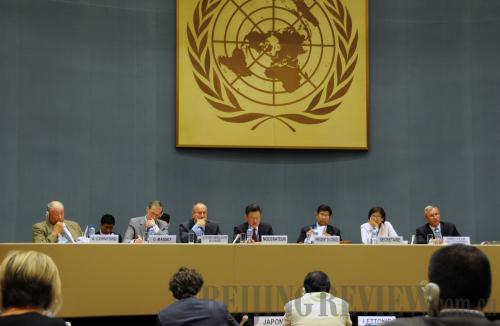|
 |
|
PARTICIPATION: UN Under Secretary General Sha Zukang (center) attends an Economic and Social Council meeting in Geneva on July 11. The Chinese diplomat called for a strengthened role of the UN and a bigger say for developing countries in international economic affairs (YANG JINGDE) |
China is a member of more than 100 intergovernmental organizations and has signed or joined more than 300 international treaties. It has become a participant, builder and contributor of international systems.
In terms of environmental protection, especially in global warming prevention, China is the first developing country to formulate and implement a national climate change program. It is also one of the countries that have made the greatest efforts in emissions reduction and achieved the most rapid progress in new energy and renewable energy research.
China insists on dealing with territorial and maritime rights disputes between neighboring countries through dialogue. It advocates shelving disputes and seeking joint exploration of marine resources, and trying its best to maintain peace and stability in the South China Sea and the East China Sea.
China has always opposed practices that go against the purposes and principles of the UN Charter as well as attempts to resort to force. For instance, it has promoted talks on the Korean Peninsula nuclear issue and the Iranian nuclear issue. It helped launch the six-party talks, which involve North Korea, the United States, South Korea, China, Japan and Russia, to resolve the North Korean nuclear issue. It has also contributed to the common development and prosperity of the Asia-Pacific region through participating in bilateral and regional cooperation.
Currently, a series of international judicial bodies together play an important role in the realization of international justice and the maintenance of international order. Chinese judges and scholars have taken positions in these bodies.
Although China is not a signatory state of the Rome Statute of the International Criminal Court that was adopted at a conference in Rome in 1998 and entered into force on July 1, 2002, it sent a delegation to the Rome conference.
After the International Criminal Court was established, China participated in the review of the Rome Statute as an observer state. What's more, it expressed opinions on major issues including the definition of the crime of aggression, universal criminal jurisdiction and the relationship between the International Criminal Court and the UN Security Council.
When international judicial bodies came to decisions or released advisory opinions, Chinese judges expressed their stances by making dissenting opinions or individual opinions. In this way, they could have a say in international judicial processes. At the same time, they injected Chinese thinking into international law and helped enrich its theoretical system.
Since the beginning of the 20th century, the international community has witnessed a surge of international organizations. The activities of these organizations have penetrated into all aspects of the international community.
China has always attached great importance to international organizations. It has supported these organizations with the UN as the core. A large number of Chinese professionals work as officials, staff members and volunteers in these organizations.
In the meantime, China has contributed to the establishment of international organizations. In 1997, the International Network for Bamboo and Rattan became the first international organization headquartered in China. China has also played a leading role in the establishment of the Shanghai Cooperation Organization (SCO), whose Secretariat is located in Beijing.
The SCO is a new type of regional organization. It does not target any third party, but aims to promote cooperation between its member states in the fight against the three forces of terrorism, separatism and extremism, and to maintain regional peace. After more than a decade's development, the SCO has become an important force in the maintenance of regional peace, security and stability.
Through globalization, the international community has become increasingly interdependent. Cross-border exchanges have increased dramatically. Against this backdrop, international economic law and private law are playing a more significant role.
After many years' hard work, China entered the WTO in 2001. China not only conducts international economic activities based on WTO principles, but also resolves legal disputes with other members according to these principles. To date, five Chinese scholars have been designated by the WTO Appellate Body as legal experts or lawyers.
In addition, China has taken a further step in devising international private law with the enactment of the Law on the Application of Law for Foreign-Related Civil Relations.
The author is a professor with the School of Law and Politics at the Zhejiang Sci-Tech University | 